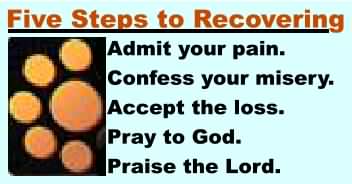
Trusting through Treacherous Times
Psalm 55
Paul J. Bucknell
_________________________
Waiting Upon the Lord | Waiting & Planning | Steps to Waiting | Fail to Waiting
Biblical Perspective on Waiting| Waiting for Ministry |Waiting for Revenge
Waiting for a Wife | Trusting through Treachery | Waiting for Christ's Return
Study Questions | Testimonies on Waiting Upon the Lord | Godly Man Index
Purpose
Trusting Through Treacherous Times shows five steps to recover from betrayal through Psalm 55.
We think times are bad but when we are betrayed by a friend evil takes on a whole new meaning.What is so difficult about being betrayed?
The closer they are to you, the more the pain.
David knew the bitter pain.
Waiting upon God means bringing your pain to God in prayer.
Five Steps to Recovering
St. Patrick's Example of Forgiveness
I am not sure treachery is that common. I have experienced it several times in my life, though nothing so serious as David. In Psalm 55 David's life was in severe danger over a long period of time. We are not told about when this happened, but more than likely it was the time his very own son, Absalom, usurped the kingdom from him. Instead of fighting, David organized his affairs, and left with a train of people and supplies.
What is so difficult about being betrayed?
David hits on the problem when he says,
For it is not an enemy who reproaches me, Then I could bear it; Nor is it one who hates me who has exalted himself against me, Then I could hide myself from him. But it is you, a man my equal, My companion and my familiar friend. We who had sweet fellowship together, Walked in the house of God in the throng. (Psalms 55:12-14).
David knows. Jesus knows.
|
Of course there is some measure of evil taken against a person. It might be theft, slandering, belittling, attempting to hurt or even take ones life. These things are bad enough. No person likes being violated. Anyone facing such circumstances would think there is no worse than what they face. But David knows. Jesus knows. Treachery is something worse than violence and injustice. Treachery happens when those who attack you are a friend.
The closer they are to you, the more the pain.
We should suspect that Satan had everything masterminded so carefully during Passion Week. He so carefully framed things that Judas, one of Jesus' most intimate friends, would betray Him and the rest of His disciples desert Him. People who have experienced treachery know there is something worse than the actual violent actions.
David knew if it was an enemy, he could bear it. If it was someone who hated him, this would be no problem - so to say. In this case, he would be able to 'hide' himself. I understand this means that the whole thing would be impersonal. He could just block it out of his mind at times. But here it was so personal. Listen to his words in 13-14,
The very depths of pain his soul experienced was a type of the betrayal Jesus would face. We don't find many words in the Gospel's describing Jesus' response to the betrayal. There was no time for that. After the betrayal, there was the mock trials, the scourgings, the beatings...
But all throughout this time was the intense personal pain of betrayal which David nor Jesus  could 'hide' from. They were part of the tears that swelled from his eyes in His passionate crying on the Mount of Olives. The thoughts hounded Him through the trials, the accusations, right to the pounding of the nails through His flesh on the cross. What absolute misery the Prince of Peace experienced.
could 'hide' from. They were part of the tears that swelled from his eyes in His passionate crying on the Mount of Olives. The thoughts hounded Him through the trials, the accusations, right to the pounding of the nails through His flesh on the cross. What absolute misery the Prince of Peace experienced.
Perhaps we can console ourselves that our treachery will never be as bad as David's or Jesus. This will help some. But we still need to deal with the personal pain that we cannot hide. The thoughts of "How could he do this?" Will his evil wind like an eternal snake through the crevices of my mind. What did they do to deserve it? What can we do now?
We will need to wait upon the Lord. This might sound like a simplistic answer to such agonizing pain. It isn't though. David did this very thing.
No doubt Jesus did too. Some people say that such words hide from the real issues. I would counter that by saying it is only when we understand these words do we begin to face the depth of the pain. Yes, we see David wishing his personal persecutor to "go down alive to Sheol" (15). But we also see how he went to great lengths not to hurt King Saul. We hear Jesus words, "Forgive them, for they know not what they do." Could they have rightly carried out their duties had such bitterness dwelt in their souls?
David gives us two sets of statements that bring light to an otherwise very dark room.
As for me, I shall call upon God, And the LORD will save me. Evening and morning and at noon, I will complain and murmur, And He will hear my voice. (Psalms 55:16,17).
David in this first few statements simply says that he will bring his complaint to God. As much as it hurts him, he will go to God with it. One might think this is self-pity, but no. He is not ending upon what cannot be done but instead on what God will do. Notice the phrase, "And He will hear my voice."
Waiting upon God then means bringing your pain to God in prayer.
As for me, I shall call upon God, And the LORD will save me. Evening and morning and at noon, I will complain and murmur, And He will hear my voice (Psalms 55:1-17).
David in this first few statements simply says that he will bring his complaint to God. As much as it hurts him, he will go to God with it.  One might think this is self-pity, but no. He is not ending upon what cannot be done but instead on what God will do. Notice the phrase, "And He will hear my voice."
One might think this is self-pity, but no. He is not ending upon what cannot be done but instead on what God will do. Notice the phrase, "And He will hear my voice."
--- Purchase The Godly Man and its ten studies in easy epub or pdf format!
It means turning all sense of personal revenge over to the King of Justice. We are to wait upon God to rightly deal with this situation. We quickly confess we do not have the answers. We do not know how to deal with the wicked. We are too personally grieved to rightly handle it. But this does not mean there is nothing to deal with. Any such great violation will demand moral satisfaction. Only God can deal with this. There is one more set of words that is cast from a different light.
Cast your burden upon the LORD, and He will sustain you; He will never allow the righteous to be shaken. But Thou, O God, wilt bring them down to the pit of destruction; Men of bloodshed and deceit will not live out half their days. But I will trust in Thee (Psalm 55:22-23).
This second set of statements becomes a beautiful exhortation. This is proof that the very thing David had already done has begun to bring some sort of relief to his soul. When he took this great burden and gave it to the Lord, God actually took it. God will sustain you and me when we wait upon the Lord.
In this case wait upon the Lord means to give your burden to the Lord. What does this practically mean? Let's take the very situation of being betrayed by a friend. You feel empty, passionately angry and very upset. You want to move from this inappropriate response to not being 'shaken' (22). How is this possible?
Let's mention six steps to recovering from betrayal.
Admit your pain. Hiding the pain never helps. The only valid time one might do this is to hold the anguish off until you can get alone with God and not take your anger out on others. Confess your misery.
Entrust them to the judgment to God.Pray to God. Forgive your former friend of each of the things he did wrong. (Remember forgiveness doesn't mean you minimize what they have done. What they have done is tragic. Forgiveness means you personally will release the guilt against you. "Revenge is mine" the Lord says. Ask the Lord to specially heal you. Pledge to the Lord that you will trust in Him (23). By trusting in Him, you need grace: to forgive as He has instructed to be patient in the way God deals out His justice Praise the Lord.
This differs from above by actually stating the details of the injury. We do not say he is simply injured. We want to know what exactly was hurt, what degree pain, etc. If we stop with these details and focus on them, then it would be called self-pity. We want to go forward from here. These injuries will become what we pray about.

Don't turn to lawsuits. Give up the loss of money, time, reputation, emotional and physical pain. Perhaps even the loss of friends or ministry ('kicked' out of church). You do hurt. But as Jesus took the pain on Himself so you now also become like Christ. What is done is done. Believe that God can do something through it all for greater purposes just as He did through the death of Jesus.
Pray specifically about several matters.
Tell the Lord about how bad you were hurt (and still are).
You will need to go one step further by praising God for the way He takes care of you. It might be public testimony or with a friend in private, but definitely it must be in your heart. Your trust in Him means that you have come full circle and are able to praise Him for the whole circumstance and how He is caring for it and you. This time also allows you to voice your confidence in God. When we do this, we sense a stronger and more vibrant faith.











 Other great resources on Waiting Upon God!
Other great resources on Waiting Upon God!